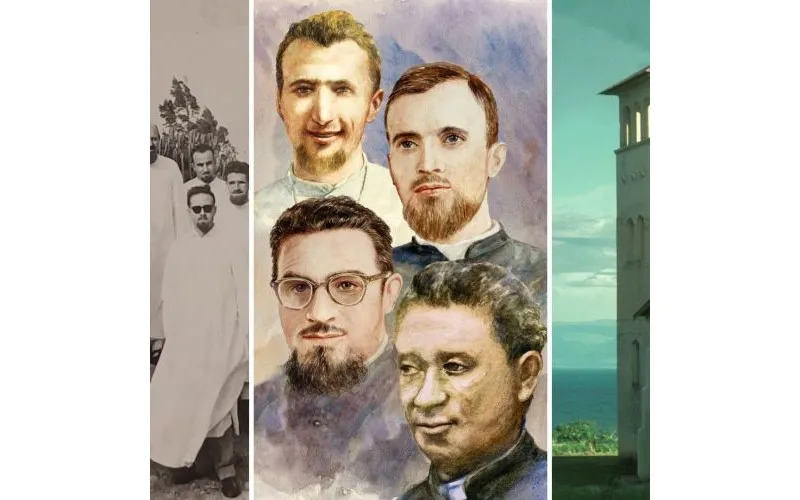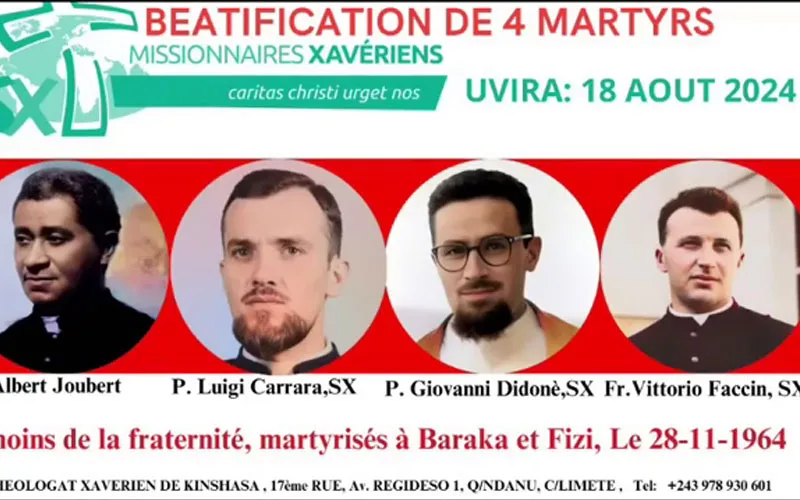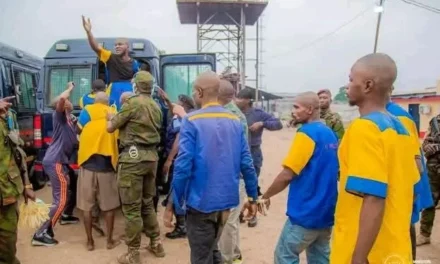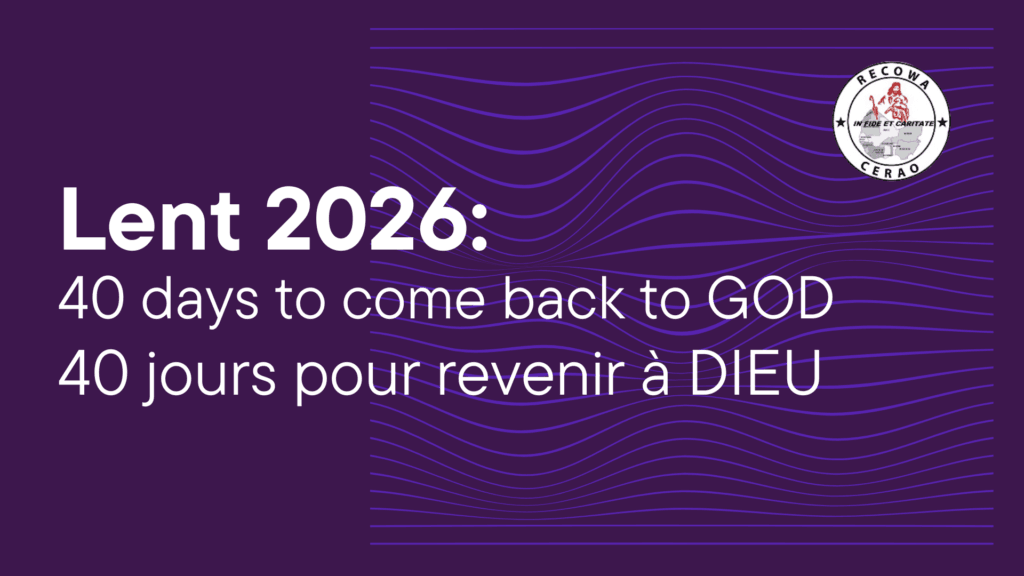Cardinal Ambongo has recently declared that the Blood of Four Newly Beatified Martyrs constituted seed for the profound evangelization in DR Congo and in the world at large. Reporting from Kinshasa, the political capital of Congo DR, the official reporter of our Online Journal stationed in this city has filed the news which said that the blood of the four Congolese martyrs, who were martyred by anti-religious guerrillas in the Kwilu Rebellion in the Democratic Republic of Congo (DRC) in 1964 has, over the years, facilitated the evangelization mission of the Church locally and across the globe. This view was revealed by Fridolin Cardinal Ambongo who doubles as both the Archbishop of Kinshasa as well as the president of African Catholic Bishops Conference under the Aegis of SECAM-SCIAM.
In his homily during the Beatification of the three Xaverian missionary Priests martyred alongside a Diocesan Priest in DRC’s Catholic Diocese of Uvira, Cardinal Ambongo, the delegate of the Holy Father at the celebration, said he is “convinced” the four martyrs will intercede for lasting peace in the Central African nation.
“Their blood has since become a seed for the profound evangelization of the Diocese of Uvira, the entire DRC, and the whole Church,” the Local Ordinary of DRC’s Kinshasa Catholic Archdiocese said during the Sunday, August 18 celebration, referring to Fr. Luigi Carrara, Fr. Giovanni Didoné, Fr. Vittorio Faccin, and Fr. Albert Joubert.
In December 2023, Pope Francis recognized the martyrdom of Fr. Luigi, Fr. Giovanni, and Fr. Vittorio Faccin, all Italian-born Xaverian Missionary Priests, killed in Uvira Diocese alongside Fr. Albert, a local Diocesan Priest born to a French father and African mother.
In his homily, Cardinal Ambongo highlighted the significance of the four martyrs to the people of God in various countries, saying, “This beatification means that our local Churches, particularly those in the DRC, Italy, and France, can now invoke their intercession and publicly devote themselves to them.”
“I am convinced that the blood of our blessed martyrs will obtain for us the gift of peace,” the Congolese Cardinal, who serves as the President of the Symposium of Episcopal Conferences of Africa and Madagascar (SECAM) since February 2023 said at the courtyard of St. Paul Cathedral of Uvira Diocese on August 18.
He continued, “Martyrs don’t just fall from the sky. Nor are they extraordinary beings. Rather, martyrs are Christians like us, like you and me. Only, they lived their lives in an exceptional way, demonstrating fidelity to God and his word in a sometimes-hostile environment.”
“Because they did not betray their faith, our four martyred brothers are proclaimed blessed today, and thus brought to the honor of the altar and proposed as models of Christian life,” the Congolese member of the Order of Friars Minor Capuchin (OFM Cap) further said.

Through the beatification of the four Catholic Priests, he went on to say, “the Church recognizes and confesses that physical death was not victorious, and that God has not abandoned his servants. On the contrary, he rewarded their fidelity by taking them to heaven to contemplate his face in the company of angels and in the communion of all the saints.”
“To be a martyr is to be a witness, to bear witness; a Christian is one who bears witness to his faith in Christ wherever he may be,” he said citing Acts 1:8, and added, “Despite suffering, persecution, and temptation, the Christian stands firm.”
Cardinal Ambongo, a member of the Papal Council of Cardinals that Pope Francis established in March 2013 to advise him on the reform of the Roman Curia since his appointment in October 2020, went on to reflect on the personal sacrifice of the four Priest martyrs.
“At the height of the rebellion of the 1960s in our country, the DRC, when they had the option of going into hiding, our blessed martyrs agreed instead to bear witness to their evangelical brotherhood by remaining at the side of their faithful in Fizi and Baraka until the shedding of blood, until death,” the Congolese Cardinal reappointed to Papal Council in March 2023 said.
“Our Blesseds today join the line of people dressed in white who stand before the throne of the Lord,” he said, adding that the four beatified martyrs “join the two others we already know, Blessed Marie-Clémentine Anuarite Nengapeta and Blessed Isidore Bakanja. We now have six instead of two.”
“Sr. Anuarite, whose 60th anniversary of martyrdom we are celebrating, was massacred the same year, 1964, as the four new martyrs and blessed. She was massacred in circumstances similar to those of today’s four. All these blessed martyrs make us proud today and are an expression of the vitality of our Curch,” the Congolese Cardinal said.
He continued, “As we celebrate and welcome our new Blessed Martyrs today, let’s be clear about our Christian vocation and what God has destined us for.”
Cardinal Ambongo went on to denounce violent conflicts, saying, “Enough violence, enough barbarity, enough killings and deaths in Uvira Dioceses, in the east of the DRC, but also enough deaths, enough blood spilled in our Great Lakes sub-region.”
“Why so much blood? Why so much violence?” he posed, and observed, “Violence and war are the fruit of thoughtlessness. Violence and death are carried out by people who stray from the path of intelligence and wisdom. It is the work of people, foolish people, who have neither the fear of God nor respect for man, created in the image and likeness of God.”
“God didn’t like violence. God didn’t like categorical divisions. God did not like conflict. Armed conflict degrades man. Instead of making him grow, conflicts, wars, and divisions bring us down. And deprive man of the dignity of a child of God,” he emphasized, adding, “Violence, conflict, and war are the work of the devil and his henchmen who sow desolation and death.”
August 18 beatification was the culmination of months of preparations that the Diocese of Uvira undertook, which saw the city come alive with the arrival of thousands of pilgrims from across the DRC and beyond. A triduum of prayer and two days of conferences preceded the beatification liturgy.

Earlier, in April, members of the Provincial Episcopal Assembly of Bukavu (ASSEPB) lauded the planned Beatification as a sign of the dynamism of the people of God and the heroism of Priests and women and men Religious amid DRC’s security challenges.
“We give thanks to God for the gift of joy and life He continues to gratify our local Churches,” ASSEPB members said in their April 14 collective statement in which they decried “endemic insecurity”.
Frs. Carrara and Didoné, together with Brother Faccin were killed on 28 November 1964, in Baraka and Fizi, two locations in Uvira Diocese.
A military jeep halted at the Baraka Church, and amidst the chaos, Br. Faccin was commanded by a rebel leader to board the vehicle. His refusal led to a tragic outcome, as he was ruthlessly shot.
Fr. Carrara, who was hearing Confessions, emerged from the church and rather than comply with the assailants, knelt by his fallen brother. His unwavering solidarity cost him his life, becoming another victim of the senseless violence.
A few hours later, in Fizi, the same fate befell Frs. Didoné and Joubert. The rebel squadron arrived in Fizi, and the leader knocked on the door of the mission, killing Fr. Didoné in cold blood when he came to the door, and shortly afterward doing the same to Fr. Joubert.
Fr. Luigi Carrara
Born in 1933, Fr. Luigi was known for his courage and deep faith. As a missionary in Baraka, he devoted himself to the education and spiritual care of the local community members.
Fr. Giovanni Didoné
Fr. Didoné, who was born in 1930 distinguished himself for his tireless service and love for those most in need. Working at Fizi, he became a pillar of support and spiritual guidance for many.
A Diocesan Priest, Fr. Albert served hand in hand with the Xaverian Missionaries. His apostolate in Fizi and his martyrdom alongside Fr. Didoné highlight his commitment to the mission and his courage in the face of adversity.

- CATHOLIC ARCHBISHOP IN GHANA HAILS POPE LEO XIV AS GOD’S GIFT - 23 mai 2025
- POPE LEO XIV TO APPROVE CANONIZATIONS - 22 mai 2025
- THE EVOLUTION OF PAPAL TRANSPORTATION - 20 mai 2025







